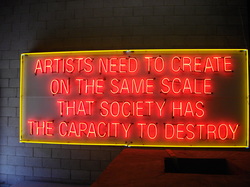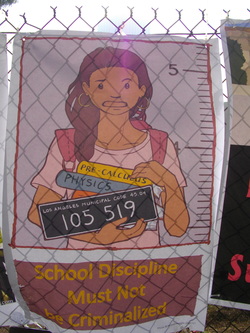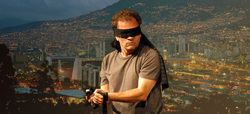Restorative Justice in Los Angeles Schools
In May, when the LAUSD board voted to end the practice of suspending students for "willful defiance," the blogosphere
heated up. Monica Garcia, then board president, was called a moron, and students were referred to as thugs, animals, and savages. Well, guess what, haters? You ain't seen nothin' yet.
On Wednesday, after the school year began with LAUSD rolling out a plan to replace punitive disciplinary measures
with the practices of restorative justice, Garcia was applauded by community advocates at a meeting at Loyola Law School. In return, she gave the activists their props: "It's because of your advocacy," she said.
The restorative justice initiative was championed by community groups including CADRE, Community Rights Campaign,
Dignity in Schools, and Youth Justice Coalition, all committed to keeping kids out of the criminal and juvenile court system and in school. This approach asks, Who was harmed? How can that harm be repaired? What are the needs and
responsibilities of the parties? How can the parties be held accountable in a positive and healthy way?
"Here lies the solution to a lot of issues that arise in juvenile justice," said Donna Groman, and she ought to know. As a Superior Court judge serving at Eastlake Juvenile Court, she has years of experience with the current system. "I see 10-year-olds in court. Why are they there? They are arrested by school police," and she pointed out, "We are not talking about crimes that endanger the community." She sees young children who sit in a waiting room with older gang-involved youth. "They are missing school. Their parents are missing work." She has seen how slowly the court system moves, so that a troubled family may wait months without anyone asking questions or providing services or taking action. In the meantime, children may be denied reentry to school. And school, she believes, is where the response to disciplinary
infractions should happen. "School is the center of the community. Court is not the center of the community and the community is where the problems of youth should be addressed."
A panel of administrators, teachers, and advocates then spoke of their own experiences in working for change.
Michelle King, Senior Deputy Superintendent, LAUSD, acknowledged there was resistance at first to discipline reform. Teachers complained that if they couldn't suspend disruptive students, they wouldn't be able to teach. But teachers now recognize the old ways don't work and are asking, What can we do differently?
It starts, said Joe Provisor, with council circle. As the director of the Ojai Foundation's Council in Schools initiative, he has trained more than 2,000 LAUSD teachers in the simple and ancient practice of people sitting in a circle and speaking from the heart. "For most of history, this is how we learned," he said, "in circles, facing each other," a model very different from what has become traditional in our education culture, with the teacher being "the sage on the stage." In a circle, a talking stick is passed around so that everyone has a chance to speak. Everyone listens, attentively and compassionately, without judgment or criticism.
For skeptics who are averse to anything that smells like a therapy session or what they might consider New Age
crap, King cites a simple solution. Administrators and teachers should participate in circles before introducing them in the classroom. What she has seen is not only do they gain competence in the technique, but they embrace the idea after they see it's helped them resolve tensions and communicate and collaborate more effectively with colleagues.
Twenty-five LAUSD schools now regularly use council circles, either incorporated into instruction (so that personal responses and critical thinking can be encouraged, for example, in literature and social studies classes), or with specific times to address school issues allocated on the schedule, or called for when problems in the classroom arise.
Circles are a first step, says Provisor, to creating a web of connectedness, making sure each kid feels seen, listened to, and respected.
Cynthia Castillo, who uses circles in her South LA classroom, reported the response from a student: "You made me feel
like I'm human and that you want to know who I am."
Once the sense of community and of trust is created, successful school-based behavioral interventions become possible. Then the restorative justice model can be used to address disciplinary infractions and for conflict resolution or, as Provisor prefers to say, conflict exploration. It's not as though students are allowed to get away with anything. They are held accountable for their behavior, but it's "accountability," he said, "in a context of care."
That can make all the difference.
"It's relationships that change children," said Schoene Mahmood, of the Center for Urban Resilience Restorative Justice Project at Loyola Marymount University. Before coming to LA, Mahmood facilitated conflict resolution and court diversion
cases at the Community Conferencing Center in Baltimore, Maryland, and saw restorative justice successfully resolve problems in some of that city's toughest (as per "The Wire") neighborhoods.
Ben Gertner, assistant principal at Roosevelt High School in Boyle Heights, first taught there in 2002 and was
dismayed that, for years, students coming late to class were either sent to waste time in a "tardy room" or ended up in court with truancy tickets. Of course it looks easier (even if it's ineffective) to send a kid to the tardy room than it is to address the real underlying issues. But, he reported, after two teachers attended training offered by the California Conference for Equality & Justice, they spoke up in a meeting of 120 RHS teachers and heartily endorsed the restorative justice approach. One said, "It has transformed my teaching." Today, there's a restorative justice coordinator at Roosevelt.
"Restorative justice is not just like this magic solution," said Castillo. "You have to lay the groundwork with the
community building, slowing down and really listening to each other. It's hard. But we have to stop outsourcing discipline."
"We have an addiction to over-policing and punitive measures," said Julio Marquez who was, himself, pushed out of school. Now he's a graduate of Free LA High School and an organizer with the Youth Justice Coalition. We call the police right away, he said, because "people don't want to believe in this radical notion of just talking to someone."
He shared a recent experience when he saw an old friend from elementary school who was bleeding and apparently
suicidal. Relying on their old relationship and trust, Marquez talked him down and calmed him enough so that he could get him to accept medical care. But when Marquez phoned for the paramedics, the police arrived first. They immediately
slapped on the handcuffs. So much for trust.
Marquez prefers to talk about transformative rather than restorative justice. It's not enough to repair harm and go back to the status quo. He wants to see our society change in profound ways for the better.
All of the panelists believe that by whatever name, this new way of envisioning and implementing justice has ripple
effects in the wider community.
When Castillo explains about circles to her students' parents, they often react with excitement and say they are
going to try it at home with their kids. Provisor has trained officers with the South Gate police department who now participate in circles with students at the International Studies Learning Center. He has also trained community
members who then sit in on student circles, by their presence letting every young person know there are adults who listen to them and who care.
Face-to-face caring conversations in our classrooms: this is very different from teaching to the test.
For now, the change in our schools is just beginning. Full implementation of restorative justice will take years but
LAUSD hopes to be a model for the nation in creating an educational climate in which students feel like valued members of the school community – open to learning academic subjects and life lessons in a way that is nurturing, respectful, and humane.



 RSS Feed
RSS Feed
